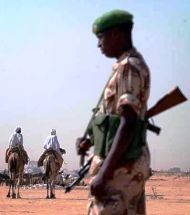UN reduces staff in West Darfur
Jan 6, 2005 (UNITED NATIONS) — The United Nations has decided to significantly reduce U.N. staff in parts of Sudan’s volatile West Darfur region because of increasing insecurity and the growing possibility of a war between Sudan and neighboring Chad.

|
|
A Rwandan African Union soldier patrols at Abushouk camp near El Fasher in North Darfur, Nov. 3. (Reuters) . |
A statement from Jan Pronk, the top U.N. envoy in Sudan, said Thursday there would be no evacuation and the United Nations would continue to provide emergency food and health services, water and shelter.
“This decision was taken due to the increasing instability in the affected areas, including a build-up of forces on either side of the border with increased potential for armed conflict,” Pronk said.
The security level has been raised in the northern area of West Darfur and the southwest corridor, which will result in “a considerable reduction in the presence of U.N. staff and restricted U.N. access in the affected areas,” he said.
George Somerwill, chief of public information for the U.N. mission, said in a telephone interview Friday from the Sudanese capital, Khartoum, that about 90 people will still be needed in the affected area “to get the life-saving work done” and provide food and nutrition, shelter, water and human rights monitoring.
“That will mean a reduction,” he said, but he refused to say how many U.N. staff are currently in the affected area.
U.N. spokesman Stephane Dujarric said the U.N. Mission in Sudan will monitor the situation and carry out a fresh security assessment of the area in the next two to three weeks.
The Darfur crisis began when rebels took up arms against what they saw as years of state neglect and discrimination against Sudanese of African origin. Sudan’s government is accused of using Janjaweed militia to unleash a campaign of murder, rape, arson and looting in an effort to stamp out the rebellion.
Chad has taken in some 200,000 refugees from the two-year conflict, and another 1.8 million are estimated to be sheltering in camps within Sudan. About 180,000 people have been killed _ many from hunger and disease.
Chad and Sudan have in the past traded accusations of supporting rebel groups against each other.
In April, Chadian officials accused Sudan of recruiting, training and arming 3,000 Chadian rebels near their border in an effort to destabilize Chad.
In October, Chad closed its consulate in Darfur, claiming that Sudanese militia crossed from the region in September and killed at least 36 Chadians _ a charge the Sudanese government denied. Chad’s Foreign Ministry asked Sudan to close its consulate in eastern Chad because security had deteriorated.
Chadian President Idriss Deby asked for a one-day heads of state meeting of the six-nation Central African Economic and Monetary Community on Wednesday to rally regional support for his accusations that Sudan is instigating two nascent rebel groups in eastern Chad that have launched periodic attacks since October.
At the meeting in the Chadian capital, N’Djamena, the regional leaders backed Chad and asked the African Union to investigate.
In a report to the U.N. Security Council on Thursday, Secretary-General Kofi Annan called for urgent improvements in security in Darfur a stepped up search for “a durable political peace, including a permanent ceasefire.”
Pronk was heading to the Nigerian capital, Abuja, to attend a new round of peace talks. Annan said negotiations in Abuja “should be pursued vigorously until an agreement is reached.”
The secretary-general said there are “serious concerns” about implementation of the peace agreement signed by the government and rebels in January ending a 21-year civil war in southern Sudan though “the peace process is on track.”
While relations between the government and rebels are developing, Annan said “distrust persists on both sides” and relations may come under further strain because several contentious issues still need to be resolved.
These include the allocation of oil revenue, implementing a decision on the boundary in Abyei, which southern insurgents are supposed to leave, and “deep-rooted social issues” over administration of the capital, he said.
